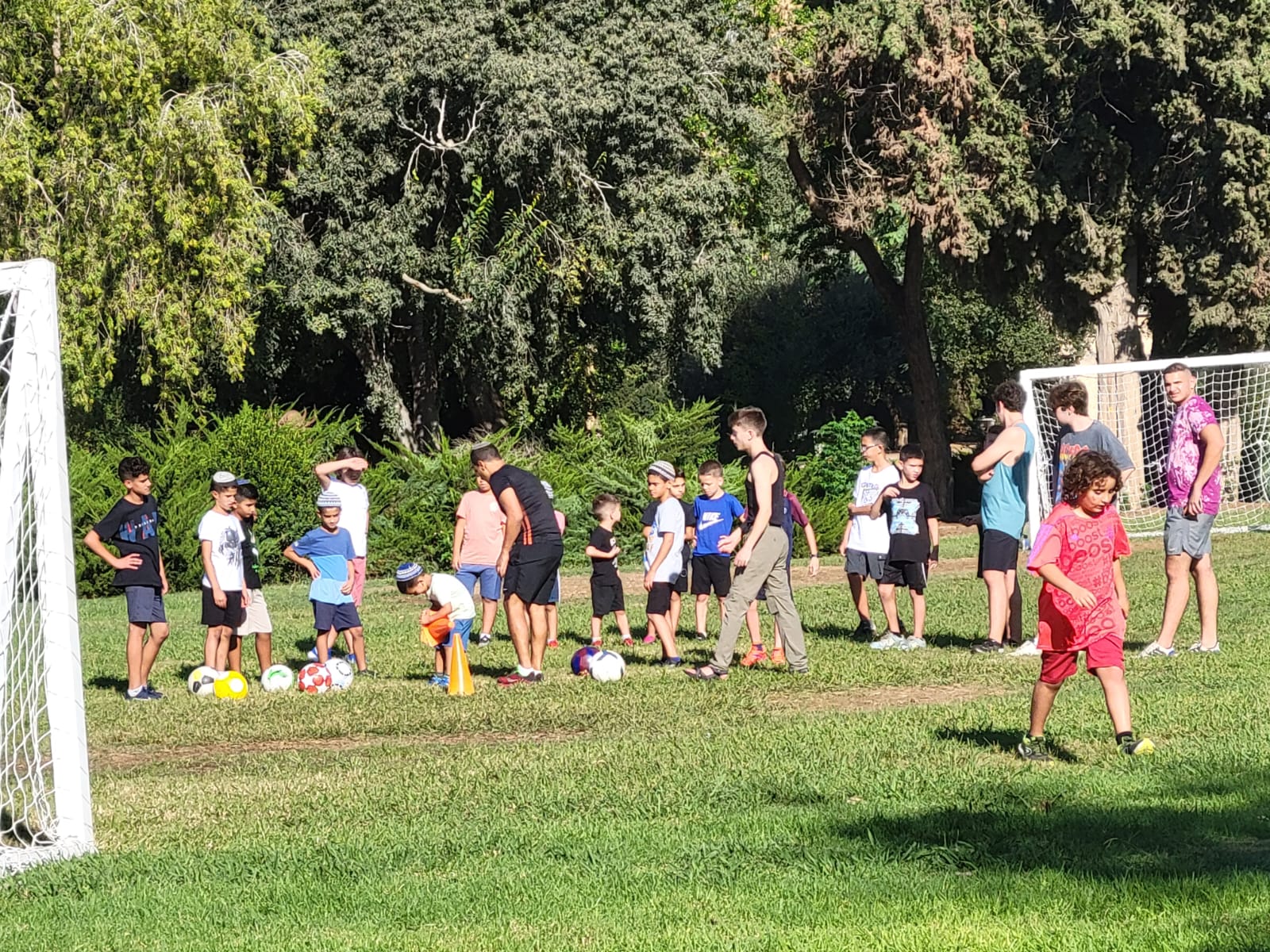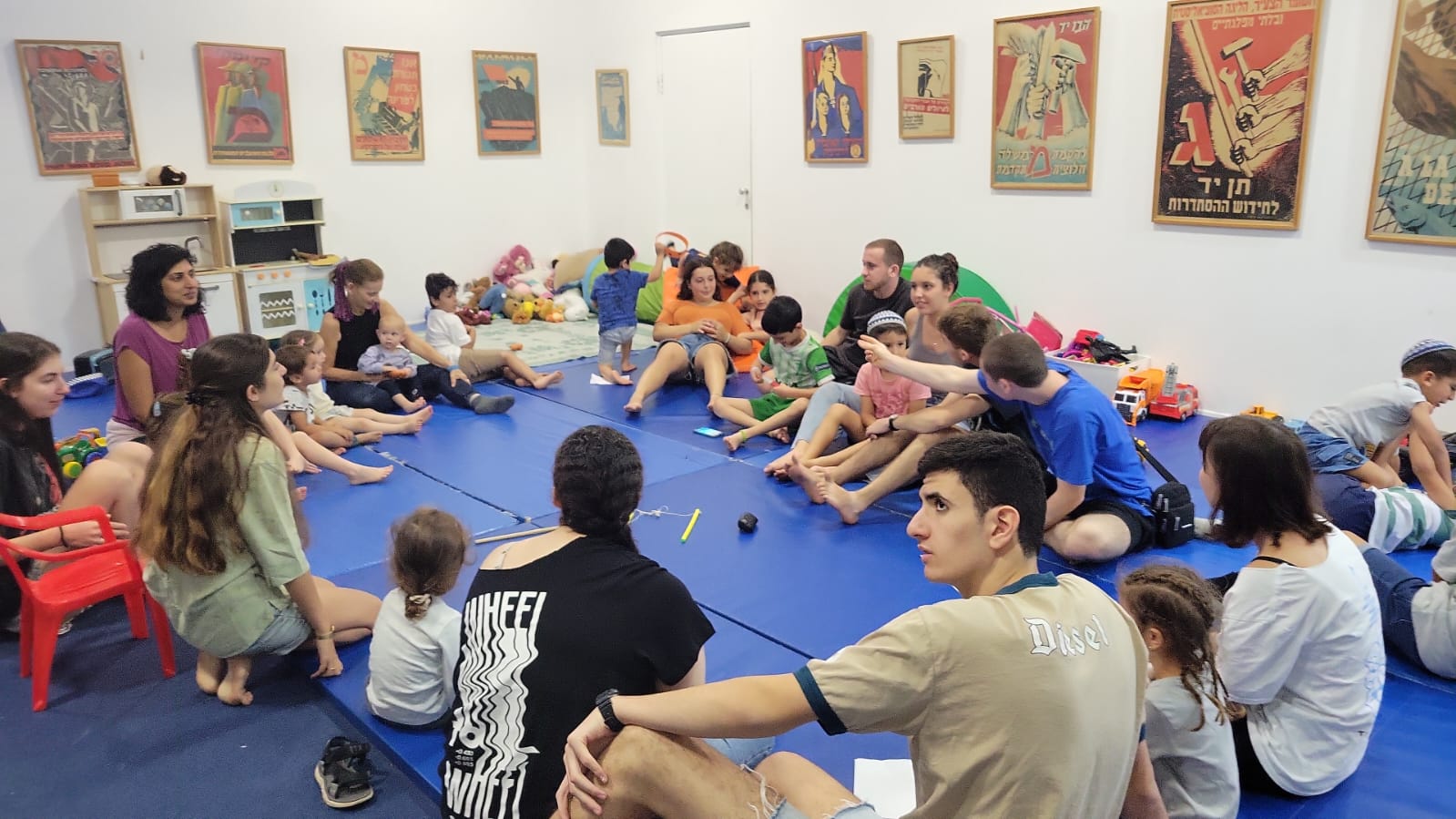
September 16, 2024
Givat Haviva 2023 Emergency Programming Report
Givat Haviva is a civil society organization for social change associated with the Havatzelet Group. We strive to create a model society in Israel, emphasizing the importance of a Jewish and Arab shared society. Ourvisionforasharedsocietyisanchoredinprinciplesofmutualrespect,trust,pluralism,and intrinsic equality between citizens. We work to promote a prosperous, democratic society for all citizens of Israel, one that strives for peace with its neighbors and for the solidarity of all peoples. Our activity focuses on the fields of education, language instruction, culture, and art. The Jewish-Arab partnership within the organization is the foundation of Givat Haviva's unique expertise and a central value underlying our worldview and practice.
Overview
After the traumatic events of October 7, 2023, individuals from both the South and North of Israel, representing diverse cultural and religious backgrounds, sought refuge at Givat Haviva campus. These families arrived amidst profound emotional strain following recent traumas. Their arrival in such distressing circumstances compelled us to swiftly develop an appropriate response, despite our limited experience in this area.
To address the mental health needs of the evacuees, we established a mental health center staffed by volunteer clinical psychologists specialized in trauma treatment. Concurrently, the Givat Haviva Shared Arts Center commenced its operations, hosting daily workshops facilitated by art therapists and leaders.
As the evacuees' emotional states began to stabilize, a sense of vitality returned to their faces, marking the commencement of their healing journey. It was crucial for us to maintain a diverse and engaging routine, providing opportunities for the evacuees to partake in music shows, art classes, and soccer practice. Essential amenities such as laundry facilities, clothing, barbershops, and more were made accessible, catering to their daily needs.
Our schedule was packed with events featuring Israeli pop artists and children's theater, aiming to foster new positive memories during their stay despite the hardships they endured.
Unlike temporary evacuee centers or hotels, we nurtured a warm and supportive community that alleviated feelings of isolation, affirming to every evacuee, regardless of age, that they were valued and significant. From the outset, our objective was to mitigate the evacuees' sense of fear and helplessness, thus facilitating their coping mechanisms. To achieve this, we formed committees entrusted with various aspects of communal life, where family representatives actively participated in planning campus programs and activities.
As schools resumed in safer regions across Israel, we connected the youth on our campus with suitable schools and arranged transportation. The art center, initially offering daily activities for children, gradually transitioned to its regular schedule, operating post-school hours. With the majority of our guests hailing from Ashkelon, when local schools reopened, we bid farewell to all our new friends by December 28, 2023.
While not all wounds could fully heal within this short span, noticeable progress was evident in the evacuees' well-being. Our campus became a haven for those in need, fostering a tight-knit community in a remarkably brief period. Many individuals from this community remain in contact today, a testament to the connections formed during their stay. This achievement wouldn't have been possible without our exceptional staff, dedicated volunteers (totaling over 40), and our resilient guests. Additionally, the support from our donors, supporters, and friends worldwide was instrumental in bringing our efforts to fruition.

Statistics
Givat Haviva Campus Capacity at any given time: 260
Total number of unique beneficiaries between October 8 – December 28, 2023 : 346
Approximate Number of Families: 45
-
Total number of single parent families: 5
-
Total number of multi-generational families staying in the same room: 15
-
Total number of adult only families: 2
-
Total number of 2 parent + children Families: 23
-
Total number of adults: 151
-
Total number of children (0-18): 195 Preschool (age 3-5): 20 Grade-schoolers (6-11): 50
-
Teens (age 12-18): 60
-
Others: 65 (not part of education track)
-
Campus Services Provided: Accommodations; Meals; Laundry
-
Activities

Givat Haviva Arts Center
Immediate Response: The Givat Haviva Shared Art Center's Initiative
Within two days following the devastating attack, The Givat Haviva Shared Art Center swiftly established an artistic activity hub catering to evacuees sheltering at Givat Haviva. Initially launching with a single workshop, the center rapidly expanded to encompass four extensive workspaces, utilizing the entire Arts Center. Collaborating with the center's staff were affiliated artists, art students, and a diverse team of art therapists, all contributing to conducting workshops, as well as individual and group therapy sessions. With each passing day, an increasing number of children arrived, accompanied by their parents.
The unwavering commitment of The Givat Haviva Shared Art Center's staff was focused on providing a secure environment for our guests, facilitating avenues for self-expression, assisting in processing their circumstances, and fostering the creation of new artistic endeavors.
Open Workshops run by The
Shared Art Center support team
and volunteer teachers: Ceramics;
Printing; Arts and Crafts; Painting; Mosaics; Sewing
Examples of some of the one-time specialty workshops: Paper Dolls, Paper Airplanes; Origami; Diary Creations

Educational Tracks
In order to meet the needs of the children, we ran two distinct educational tracks once the schools reopened in order to provide youth participants with normality and comfort.
Early Childhood Education (Ages 3-6)
Operated by qualified childcare professionals, the Givat Haviva Kindergarten was open six days a week, from 9:00 to 13:00. Each day, 20 children were supervised by a lead teacher and two assistants.
Informal Education (Ages 7-17)
Our informal education initiative focused on bringing joy to children and teenagers adjusting to unfamiliar environments. Through engaging activities, our aim was not just to alleviate their distress but also to foster a supportive youth community. Given that many families lived in cramped conditions, this program provided both young adults and children with space to heal.
Once 50 children were re-enrolled in local schools, they attended classes until 13:00. Upon returning by bus, they were offered meals in the Givat Haviva dining area. Subsequently, they convened in a specially created club from 14:00 to 16:00, where two youth counselors organized various afterschool activities.
Teenage Activities (Ages 12-17)
For the 60 teenagers, we identified suitable institutes in the vicinity that aligned with each evacuee's background. From 17:00 to 21:00 daily, two youth counselors orchestrated evening activities in a dedicated club. The sizable group of 50 teenagers was divided into smaller, age-appropriate units to facilitate their participation in tailored activities.
Examples of Activities provided by volunteers/donors
Trauma Trained Psychologist: 4 clinics
Hygiene: Barber; Beautician; Manicures
Physical Activity: Soccer; Wheels; Physical Fitness with Amit
Well Being: Acupuncture; Yoga; Meditation;
Trips: Ramat Hanadiv; Animal Activity provided by KKL; Jeep Trip; Happening by KKL
Workshops: Photography; Woodworking
Activities for young children: Variety of Performances including Incubator Theatre, House to Rent play; The Good Movie Club; Meeting stars of popular T.V. series “Kupah Rasheet”

Activities for adults children: Group singing and Performances
Interview with Campus Director Jesse Colton ‘We opened our hearts’
By Avi Bracha
If you've been walking around the green and pastoral Givat Haviva campus in the last month, you've probably heard the name "Jesse" in the air quite a bit.
Whether it is a food or equipment supplier who needs an entry permit, a volunteer who wants to do everything possible or a potential donor who wants to tour our center, Jessi is the one to go to.
With a cellphone in one hand and the other driving the golf cart, Jessie does not waste a second and manages the evacuee center established on the Givat Haviva campus in probably the most efficient way possible ever since the war began.
Today, more than a month since the beginning of the evacuee-hosting initiative, she is able to spare some of her very precious time and answer a number of questions for us.
Jesse, tell us a little about yourself.
"My name is Jesse Colton, 51 years old, mother of three children and live in Kibbutz Regavim which is part of the Menashe Regional Council.
I have been the director of the campus in Givat Haviva Since the end of August. Before that I managed an independent vacation business, I served as the manager of a country club, a gym, summer camps, and as a manager of events and productions.”
Therefore, if I understand correctly, the war caught up with you very shortly after you took office.
"Exactly. From the day I started to work here, I focused primarily on one project- the production of the ‘Festival of the Lantern' that we hosted this year on our campus.
In fact, I didn't even have time to complete the full overlap of the position, and only this week I had the bandwidth to complete it.
The festival took place between October 3rd through October 5th. It was one of our main events of art and music in which we hosted an extraordinary number of about 8,000 participants. We were in a completely different reality... and then the disaster happened."
What took place at GH from that moment?
"During previous military operations, our campus has hosted evacuees... it turns out that they remembered our hospitality well and asked to come again.
We started to receive non-stop phone calls from people who wanted to evacuate from their homes at the areas affected by the war in order to come stay with us.
At this stage, we began to understand the complexity of the situation, and without any questions, we decided to serve as an evacuee center once again.
I must point out that there was an immediate and joint mobilization of the entire staff, Jewish and Arab workers alike. Everyone was unanimous that it is our duty to stand up for those who have just experienced the horrors of the war that broke out."
How did you manage to set up the facilities in order to host about 260 people in such a short time?
"The basis for this is undoubtedly the involvement of the members of Hashomer Hatzair and the alumni movement, without whom none of this would have happened.
I would like to mention three key people who are my dedicated partners in the operation of this blessed enterprise, and thanks to their experience and knowledge, we took on the task:
Danit Angel from the alumni movement who is responsible for the hospitality rooms and operations, Gal Zuckerman who is the education coordinator and Nitai Margalit who serves as the culture coordinator.
Together, we've worked in perfect synergy and that's how we were able to provide the evacuees with a fast and comprehensive response in many areas."
What was the biggest challenge you’ve faced in this whole thing?
"There were two very significant challenges for me, the first was the reception of evacuees, each of whom came from a different cultural/religious background. We have quite a few religious guests alongside secular ones, and we had to be sensitive about the differences in order to create the correct environment and activities and to answer any guest's needs in the best possible way whatever their beliefs.
Another and no less complex challenge was the mental state of the families that came to us given their recent trauma. The fact that people came here in such a traumatic state, forced us to come up with an adequate and quick response and we managed to do so despite our lack of experience in the field.
I would like to praise Liat Katz from Kibbutz Ma'anit, who came here on a voluntary basis right at the beginning of the war. She quickly set up a complete psychological center that includes four clinics. She also recruited clinical psychologists specializing in trauma treatment for the evacuees.
Another significant thing that helped us a lot in this matter is our art therapy program. Our staff at the Joint Art Center recognized the need from the first moment and made all possible means available for the evacuated families to use. The center started operating as one complex, which grew into four different spaces that included clay work, painting and other various workshops. As the weeks go by, more and more parents and children are coming to the art center and with the help of the staff, are finding a place of refuge from the difficult experiences and slowly allowing themselves to let go of the stress and pain, to express themselves and to create something new and happy."
What do you think sets your evacuee center apart from the other accommodation options that exist?
"Unlike other reception centers or hotels where people come for a period of time to a protected area and then leave, we have created a warm and supportive community that reduces the feeling of loneliness and gives any evacuee in any age, a reminder that they are needed and important.
Our ambition from the beginning was to minimize the sense of fear and helplessness of the evacuees in order to help them deal with the complicated situation in the healthiest way possible. In order to do that, we have established committees that concern all the different areas of life, and we have placed representatives from the families in charge, therefor in every project that exists in the center, the evacuees take an active part and contribute their energy and time.
For example, one evacuee works as a soccer coach for children here. Another evacuee works in the care and beauty field and volunteered to set up a clinic for the well-being of the other women staying here. Some of our guests even used their connections to set up a fundraising campaign from Israel and abroad to help themselves and the other evacuees.
All of these efforts have created a reality where, even though we don't have luxurious guest rooms to offer, people still prefer to come here and be a part of our beautiful new and unexpected community.
Jesse, is there a particularly exciting moment that you experienced during this whole period that you would like to share?
"There are quite a few such moments in recent times, but I'd like to share two in particular.
The first concerns the youth club that we set up for the children of the evacuees, which is run beautifully by a guide named Uri. Uri made sure to organize a ceremony in memory of the late Yitzchak Rabin, former Prime Minister of Israel.
As I mentioned before, we are hosting families from different ways of life who hold various political views. Despite all this, there was a huge demand among all the youth to take an active part in the ceremony.
There are teenagers who have never taken part in such a ceremony and it was very important for them to get on stage and participate. The parents came to watch the ceremony and there was great excitement and even a number of parents who shed a tear.
Another very exciting moments, are the birthday celebrations that we mention here and celebrate together with the families. Many top Israeli artists come to perform to us every day and whenever someone had a birthday, they brought the person on stage and made sure everyone congratulated and celebrated with them. Several guests came up to me afterward and told me that it was the most exciting birthday they had ever had. It showed how much power the community we created here has!”
Finally, do you have any optimistic thoughts that you would like to share with us and that relates to everything that is happening here?
"Certainly! The Givat Haviva Center has been known for years for clear concepts and agendas regarding shared society and there are many audiences who have not been exposed to this or that naturally categorized it as something that does not speak to them.
The fact that we opened our hearts and wallets and hosted populations of all kinds created an opportunity for closeness and recognition of our ideas.
The gratitude and thanks we receive from the families of the evacuees prove that despite everything, in the end, what unites us is greater than what divides us, and that there can be even more collaborations as amazing as ours. These days we are even starting to think about a number of cooperation projects between Jews and Arabs, in which the evacuees will take an active part.
Now, after quite a while that they are here and after they have recovered a little from the tragedies of October 7, we believe that this is an additional and important value that they will be able to absorb and take on."